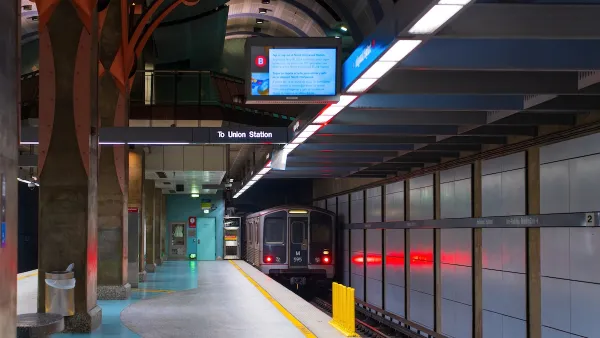Los Angeles Mayor Antonio Villaraigosa's plan to cram 30 years of transit projects into one decade is gathering steam in Washington -- and other cities are watching closely.
"The Mayor has argued his case persuasively, emphasizing the project's environmental and economic significance along with its mobility and livability benefits for Angelenos. The transit expansion itself, even if not accelerated, has much to recommend it: 200 million fewer driving miles annually, 570,000 fewer pounds of emissions annually, and 80 million more transit trips each year. If accelerated, the plan would create 170,000 construction jobs over ten years, contributing to the economic recovery of a county with almost 600,000 unemployed workers. Additionally, 30/10 would save $3.8 billion by avoiding cost inflation already calculated into the transportation plan's price tag while steering clear of the nasty parochial disputes that can derail a project when a transit system is expanded in piecemeal fashion. Finally, the Los Angeles County Economic Development Corporation estimates that the non-accelerated transit expansion would increase federal tax revenue by $2 billion, state tax revenue by $800 million, and local government revenue by $60 million over 30 years. An accelerated plan would likely have a similar fiscal impact but more quickly, providing revenue at a time when cash-strapped governments are starved for resources."
One of the most important elements of this plan is that is proposes to be revenue-neutral for the federal government.
FULL STORY: L.A. Gets Moving on Transit

Planetizen Federal Action Tracker
A weekly monitor of how Trump’s orders and actions are impacting planners and planning in America.

Maui's Vacation Rental Debate Turns Ugly
Verbal attacks, misinformation campaigns and fistfights plague a high-stakes debate to convert thousands of vacation rentals into long-term housing.

San Francisco Suspends Traffic Calming Amidst Record Deaths
Citing “a challenging fiscal landscape,” the city will cease the program on the heels of 42 traffic deaths, including 24 pedestrians.

Defunct Pittsburgh Power Plant to Become Residential Tower
A decommissioned steam heat plant will be redeveloped into almost 100 affordable housing units.

Trump Prompts Restructuring of Transportation Research Board in “Unprecedented Overreach”
The TRB has eliminated more than half of its committees including those focused on climate, equity, and cities.

Amtrak Rolls Out New Orleans to Alabama “Mardi Gras” Train
The new service will operate morning and evening departures between Mobile and New Orleans.
Urban Design for Planners 1: Software Tools
This six-course series explores essential urban design concepts using open source software and equips planners with the tools they need to participate fully in the urban design process.
Planning for Universal Design
Learn the tools for implementing Universal Design in planning regulations.
Heyer Gruel & Associates PA
JM Goldson LLC
Custer County Colorado
City of Camden Redevelopment Agency
City of Astoria
Transportation Research & Education Center (TREC) at Portland State University
Jefferson Parish Government
Camden Redevelopment Agency
City of Claremont




























